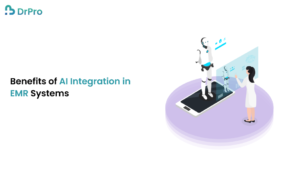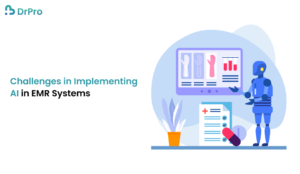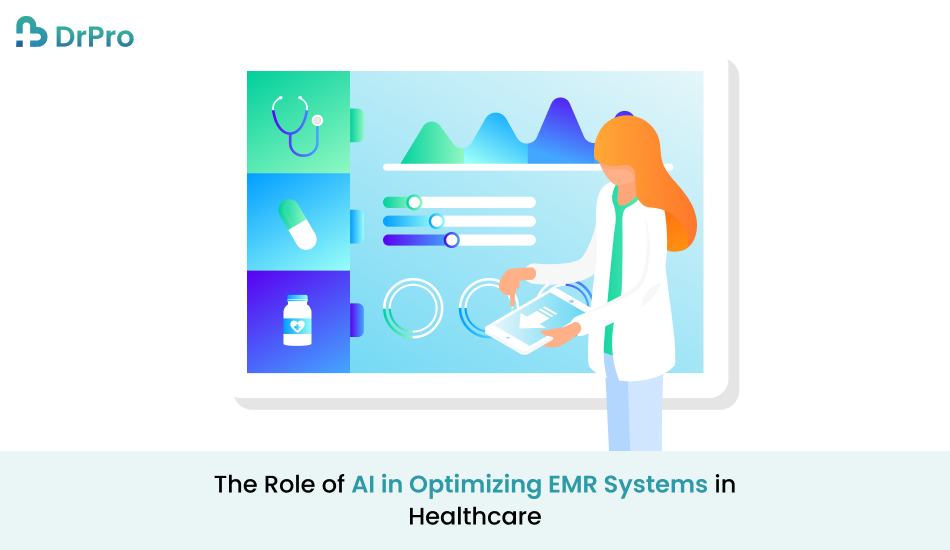Over the past few years implementing artificial intelligence in electronic medical records has become quite popular in the healthcare industry. Being a key tool in many a healthcare organization’s current agenda to provide efficient care to patients and to reduce costs, AI has the potential to bring in proportional gains in the efficient handling of large volumes of electronic health data.
In this article, we will have a look at how AI is promoting the EMR system, the positive aspects of AI in the healthcare sector, the issues organizations encounter while trying to implement AI, and trends that will continue to influence this integration in the future. We will also discuss how emerging systems such as DrPro’s EMR are applying the use of AI to improve the healthcare industry.
Benefits of AI Integration in EMR Systems

There’s an increased interest in integrating AI with EMR systems while making improvements where possible to streamline workflow and improve the reliability as well as accessibility of medical information. Here’s how AI benefits healthcare through EMR systems:
1. Improved Data Accuracy and Quality
Increased Efficiency of Electronic Records: One of the biggest concerns associated with EMR systems is data accuracy. According to the research published in the JAMA Network Open, about 29 percent of patient records inside an EMR system contain mistakes. These AL algorithms can be used as a gateway to detect errors and improve the data quality of the medical record while minimizing errors made by human intervention. For instance, it can highlight copied records or lack quality data to ascertain that a patient record is accurate and updated.
2. Time Efficiency for Healthcare Professionals
It consumes a lot of the physicians’ time to type in the information on the EMRs thus leading to time inefficient for the healthcare providers. Voice recognition falls under the NLP and can be used to automate data input wherein physicians can write patient notes directly on the system. New York Times’s report shows that the use of artificial intelligence to recognize speech cut the hours doctors spend on documentation by up to 40 %, indicating more time for patients.
3. Enhanced Decision Support and Predictive Analytics
Advice and forecasting can be helpful for a doctor and help to make decisions in a real-time mode thanks to the Predictive Analytics part of AI. The use of big data and predictive analytics means that AI can process massive amounts of data, and give an opinion that the human professional may not be able to deduce. For example, AI such as machine learning can alert a patient to the possibility of acquiring specific diseases based on the patient’s medical history and suggest appropriate treatment procedures.
Such a level of product understanding enhances the decisions made by healthcare experts making them more effective to patients. AI algorithms can also pinpoint early symptoms of diseases such as cancer or heart diseases that require serious early diagnoses.
4. Automation of Routine Tasks
in healthcare, various activities that could be repetitive include appointment making, coding, and billing which if not well managed consume a lot of time and are prone to errors. AI in EMR systems can have benefits in accomplishing these tasks, for example, minimizing the administrative burden and raising efficiency levels. For instance, when examining a patient, it is possible to set another appointment since the AI will have studied the patient’s previous visits and their conditions. This lightens the load of the staff and ensures that patients do not fail to honor their appointments hence better patient management.
5. Enhanced Patient Experience
AI can also be useful to optimize communication and thereby improve the patient experience. A lot of queries like appointment dates or times, results of tests, and simple advice concerning health concerns can be addressed by AI robots or chatbots. This positively affects the availability of healthcare and makes patient’s experience when dealing with providers more efficient.
Challenges in Implementing AI in EMR Systems

Discussing and analyzing the advantages of AI integration in EMR systems certain difficulties encountered by healthcare organizations can be listed. Managing these challenges needs strategic thinking, such as the allocation of resources and the improvement of organizational readiness for change.
1. Data Privacy and Security Concerns
Challenges to Healthcare Data Since healthcare data is regarded as very sensitive, issues of data privacy and security must be accorded the highest priority. The base of data needed for an AI system is massive and is used by the system to learn and give recommendations but this data can be hacked. EMR software should meet some requirements and norms such as the HIPAA (Health Insurance Portability and Accountability Act) which determines a very high security level. The leakage or misuse of such information is fraught with quite dramatic outcomes for both patients and medical personnel. Hence, healthcare systems that incorporate AI in their EMR have to make sure that the data is secure.
2. Integration with Existing Systems
Interoperability with other systems Most healthcare organizations have a disparate system for different services like laboratory, pharmacy, imaging, and various other services that a patient may require. Replacing existing legacy EMR systems with AI may be challenging, and deciding to implement a new AI system with an incompatible EMR system may be problematic. Integration is an intensive process that demands time and money; it can also be brought by staff who are used to old-school applications. AI models have to demonstrate compatibility between different systems to produce useful information at different stages of the continuum of care.
3. Training and Adoption
Due to the variability in the models, some AI tools might need to be learned or might need healthcare professionals to adopt them. International AI adoption may be hampered by low AI literacy or a general unwillingness to adopt new technology platforms. The healthcare sector’s limiting factors as documented in a report from The Brookings Institution include a shortage of experts and m Freeware AIDS awareness. Hence, healthcare organizations must train and support EMR adoption to make staff feel at ease using AI-integrated EMR systems.
4. Cost of Implementation
Burden and Cost of Implementation While implementing AI in EMR systems, the initial investment is quite time-consuming. Some of the changes may require a new software purchase, additional infrastructural development, and staff awareness. There are indeed long-term advantages in the adoption of AI – greater productivity and better health outcomes to mention but two – but for many organizations, especially those that are small, the costs involved could prove prohibitive. The cost could act as a significantly constraining factor to the possibility of optimizing the application of artificial intelligence in the health sector.
5. Ethical and Legal Implications
Ethical and Legal Concerns AI has several questions regarding ethical and legal interventions that arise more in the area of decision-making. However, this is not unsolvable and AI will help us have a view even though it is not sovereign. There is the possibility that the system to produce mistakes or suggest something that is not in the best interest of the patient. The challenge for healthcare providers is to make sure that AI stays adjunct to the process and does not replace human decision-making entirely. Moreover, AI-based systems need to comply with the relevant legal protocols to maintain patients’ rights but also to ensure that decisions are both explainable and explainable within an accountable AI environment.
Future Trends in AI and EMR Integration
In the future, due to advancements in artificial intelligence, its deployment in healthcare EMR systems is likely to become even more complex. Here are some key trends to watch for in the future:
1. Enhanced Natural Language Processing (NLP)
Progress in Natural language processing NLP will advance to better enable the analysis of unstructured data present in EMRs including physician narratives and patient records. The usability of EMR systems will be further enhanced and become much more effective for practitioners as the ability of AI to recognize and interpret human language gets deeper.
2. AI in Telemedicine
AI in telemedicine Telemedicine has come to the limelight and has expanded more especially with the help of the COVID-19 pandemic. AI will complement the existing frameworks of telemedicine by diagnosing patients in real time, offering insights from a patient’s data, and handling the practicalities of appointments and payments. This innovation will improve the usability, availability, and effectiveness of telemedicine to patients and doctors.
3. Predictive Analytics for Population Health
Population Health The use of AI to describe, predict, and guide the future of population health will be critical due to the possibility of processing voluminous data options. Using such tendencies AI can explore the health risks of the population within different groups of patients and forecast the further needs in healthcare suggesting the prevention measures. This will be important in solving possible matters to do with the health of the public and enhancing the results for all society.
4. AI-Powered Personalized Medicine
AI-Powered Personalised Medicine Personalised medicine is the future of the healthcare industry, given that the manpower involved is capable of incorporating artificial intelligence into practice. Algorithms can review the patient’s gene profile, medical records, and other indicators to determine what the best treatment is for a particular customer and prevent patients from receiving ineffective treatment.
5. Continuous Monitoring with AI
AI Wearables and other IoT devices will continuously monitor the patients’ data, and therefore raise the continuous monitoring volume to new heights. AI will assist with making narratives out of this unrelenting set of information; help the healthcare givers to curb patients’ health conditions as they progress; recognize imperfections early on and act to avoid readmission to hospital and other related issues.
Using Our DrPro EMR System in Healthcare
Another specific approach to the use of AI in healthcare processes can be illustrated by the description of the EMR system implemented in DrPro. Using predictive analytics and NLP, decision-making is improved, data entry is minimized, and patient records are properly maintained according to DrPro. Incorporating AI characteristics, DrPro’s EMR system assists Healthcare pundits in saving time, enhancing the patients’ quality, measurable administration of the patient’s health, and efficient decision-making for innovation of the patients’ positive impacts.
Of particular importance, DrPro is designed to be easily integrated into the existing structures of a healthcare facility, so the introduction of an AI is slick and straightforward. It is easily capable of quickly identifying and diagnosing trends early on while also delivering more personalization in treatment plans to the healthcare providers as well as beneficiaries hence the value.
Conclusion
It is without doubt that AI is revolutionizing how healthcare professionals handle electronic medical records. From data accuracy and efficiency of work and involving better data-driven decisions through the utilization of real-time analytics and improved patient experiences and more. Nevertheless, several issues need to be overcome to achieve the benefits of AI in EMR systems, including data privacy questions, integration difficulties, and a shortage of specialists.
It may therefore be said that it will be easier to be much more innovative in healthcare delivery even with AI technologies in the future. Electronic Medical Record systems, including those that operate on the DrPro, are advancing how healthcare is managed and delivered as well as aiding the healthcare professional in delivering the best quality of care.
FAQs
Q1. What is the role of AI in EMR systems?
AI enhances EMR systems by automating data entry, improving data accuracy, providing decision support, and enabling predictive analytics, leading to more efficient and effective healthcare management.
Q2. How does AI improve patient care in EMR systems?
AI assists healthcare providers by offering real-time insights, identifying potential health risks, and suggesting personalized treatment plans, which ultimately leads to improved patient care and outcomes.
Q3. What are the main challenges in implementing AI in EMR systems?
Challenges include data security concerns, the complexity of integrating AI with existing systems, the need for staff training, the high cost of implementation, and the ethical considerations surrounding AI decisions.
Q4. Can AI fully replace human healthcare professionals in EMR systems?
No, AI is intended to assist healthcare professionals, not replace them. AI provides decision support and automates certain tasks, but human judgment and expertise remain crucial in patient care.
Q5. What is the future of AI in healthcare?
The future of AI in healthcare involves advancements in personalized medicine, predictive analytics, telemedicine, and continuous monitoring, leading to more efficient, accessible, and personalized care for patients.


